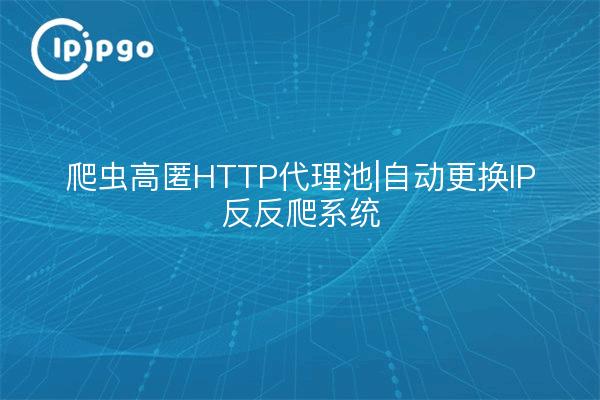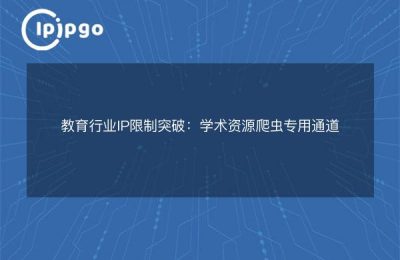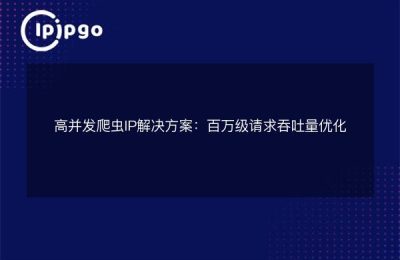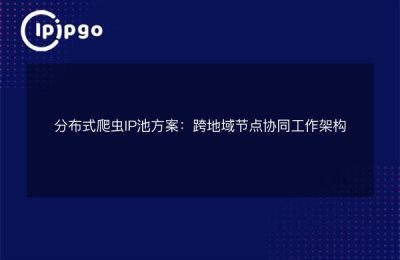
What to do if your crawler is blocked? Hands-on guide to building a high stash of proxy pools
The biggest headache for friends who do network data collection is that the anti-climbing mechanism of the target website suddenly takes effect. Yesterday, the script could run normally, but today, the CAPTCHA frequently appears or the IP is directly blocked.At this time, theHigh Stash Proxy IP Pool + Automatic Switching Systemis your saving grace.
Why don't regular proxies work?
Many newbies will find a few random free proxies to use and find out:
- IP survival time is too short (may expire in 5 minutes)
- Request header leaks real information (recognized by the site as a proxy feature)
- Inconsistent IP quality (some are slow to respond, some don't connect at all)
This is where a professional high stash agency service provider is needed. TakeipipgoAs an example, their residential agents not onlyHide real headers such as X-Forwarded-ForIt's still possible.Simulates the geographic location and network environment of real users, effectively circumventing website detection.
Three Steps to Build an Automatic IP Changing System
| move | Operating Points |
|---|---|
| 1. Obtaining the agent pool | Obtaining dynamic IP sequences via ipipgo's API is recommended for setting theNumber of extractions per extraction = number of concurrent threads x 2 |
| 2. Verification of availability | Write scripts to automatically detect IP'sresponsivenessrespond in singingDegree of anonymity(can be tested with httpbin.org/ip) |
| 3. Setting up switching rules | Two trigger mechanisms are recommended:
|
How to choose dynamic vs static IP?
Flexible selection based on business scenarios:
- Dynamic Residential IP: Ideal for high-frequency acquisition (e.g., price monitoring), ipipgo's pool of 90 million IPs ensures a new identity for each request
- Static long-lasting IP: Suitable for scenarios where session maintenance is required (e.g., post-login operations), whitelisting mechanism is recommended
In practice, it is possible to mix the two types:90% dynamic IP for regular collection, 10% static IP to handle special pagesThe
Three potholes that must be avoided
Lessons learned from real-world testing:
- Don't let the User-Agent "wear out":Browser fingerprints must be synchronized with each IP change
- Note the request interval randomization:Human operation is not precisely timed.It is recommended to set a random delay of 0.5-3 seconds.
- Use foreign nodes with caution: unless the target server is abroad, local IPs are preferred (ipipgo supports filtering by city)
Frequently Asked Questions QA
Q: What should I do if my proxy IP is slow?
A: It is recommended to turn on ipipgo'sIntelligent Routing Function, automatically assigns the node with the lowest latency. Also check if HTTPS proxy is enabled (some HTTP proxies have encryption overhead).
Q: How do I break through a CAPTCHA storm?
A: Immediately reduce the collection frequency and change the IP segment (e.g. switch from Jiangsu to Guangdong IP). It is recommended to add in the codeCAPTCHA Recognition Module + Manual Intervention MechanismThe
Q: How do I detect if an agent is high stash?
A: Visit http://httpbin.org/headers and if the returned header in theNo fields for via, x-proxy-id, etc.and REMOTE_ADDR shows the proxy IP, indicating successful anonymization.
By reasonably configuring ipipgo's proxy resources, combined with the automatic switching strategy in this article, it can effectively solve the problem of 90%'s anti-climbing. It is recommended to first useFree Trial ResourcesTest the system compatibility, and then select the corresponding program according to the business volume level.








